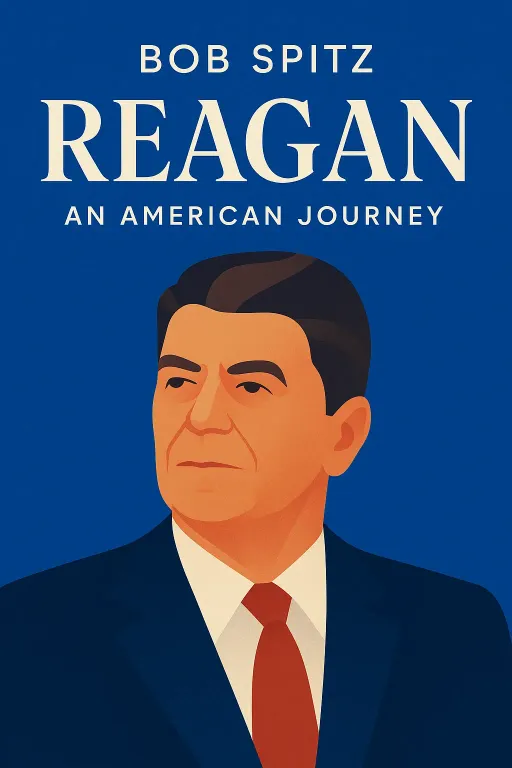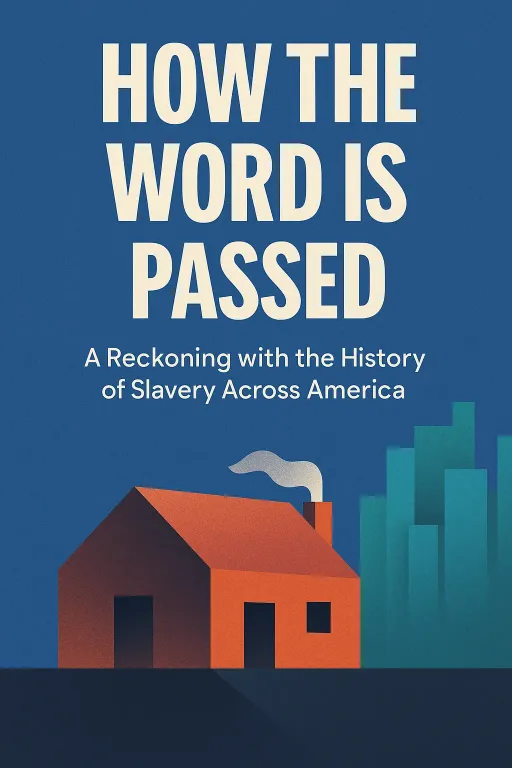
Reagan
12 minAn American Journey
Introduction
Narrator: Imagine the scene: October 1964. The presidential campaign of conservative firebrand Barry Goldwater is in a freefall. His team, desperate for a spark, pins their hopes on a televised speech by a man most of America knows as a washed-up actor, a B-movie star whose best days are long behind him. That man, Ronald Reagan, steps onto a Los Angeles stage. He starts awkwardly, speaking too fast, but then something shifts. He finds his rhythm, and for thirty minutes, he holds the nation captive, not by stumping for Goldwater, but by spinning a powerful, optimistic, and deeply conservative vision for America. That single speech, "A Time for Choosing," raised more money than any political speech in history and, though it failed to save Goldwater's campaign, it ignited a political career that would change the world. How did this former actor, the son of an alcoholic shoe salesman from Illinois, transform himself into the "Great Communicator" and one of the most influential presidents in American history? In his comprehensive biography, Reagan: An American Journey, author Bob Spitz meticulously charts this improbable rise, revealing that the man and the myth were forged by a lifetime of performance, personal hardship, and an unwavering belief in the power of a good story.
The Storyteller Was Forged in Hardship
Key Insight 1
Narrator: Ronald Reagan’s identity as a master narrator was not born in a Hollywood studio or a political war room, but in the instability of his early life in small-town Illinois. His childhood was defined by two powerful, opposing forces: his father, Jack, and his mother, Nelle. Jack Reagan was a charming, charismatic shoe salesman whose life was tragically undermined by alcoholism. One of the most searing memories of Reagan's youth was coming home on a freezing winter night at age eleven to find his father passed out drunk in the snow on the front porch. The young Reagan had to drag his father's dead weight into the house, an experience that instilled in him a deep-seated resentment of his father's weakness but also a lifelong desire for order and control.
In stark contrast was his mother, Nelle, a woman of unshakable faith and boundless optimism. She was the family's anchor, teaching her sons that Jack’s drinking was a sickness, not a moral failing. During the lean years, she would resourcefully stretch their meager budget, once serving a dish she called "oatmeal meat"—a patty of oatmeal disguised in gravy—and presenting it with such love and flair that her sons believed it was a delicacy. It was Nelle who first pushed a shy, insecure Reagan onto the church stage, where he discovered the intoxicating power of an audience's applause. That applause became a balm for his insecurities, teaching him that performance and storytelling were not just for entertainment; they were tools for survival, for creating a more ideal version of reality, a skill that would later define his political career.
Hollywood's Political Crucible Forged an Anti-Communist
Key Insight 2
Narrator: When Ronald Reagan arrived in Hollywood in 1937, he was a staunch supporter of Franklin D. Roosevelt and the New Deal. He believed, as he later said, that "government could solve all our postwar problems." His political transformation from a liberal Democrat to a conservative icon was forged in the fiery labor disputes and ideological battles of post-war Hollywood. His first major political test came through his involvement with the Screen Actors Guild (SAG) and liberal groups like the Hollywood Independent Citizens Committee of the Arts, Sciences, and Professions (HICCASP).
Reagan initially joined HICCASP with idealistic fervor, but he quickly grew disillusioned. At one pivotal meeting, a proposal to condemn communism alongside fascism was met with furious resistance from members who openly defended the Soviet Union. Reagan, who spoke in favor of the proposal, was shouted down as a "Fascist." The experience was a political awakening, revealing to him how communist sympathizers could infiltrate and manipulate well-meaning liberal organizations. This suspicion was solidified during the violent Hollywood strikes of 1946, where Reagan, as a SAG board member, found himself in the middle of a bitter war between rival unions. After receiving a threatening phone call warning him that a vial of acid would be thrown in his face, Reagan began carrying a .32 Smith & Wesson revolver for protection. He came to believe the strikes were being orchestrated by communists to seize control of the industry. These experiences, culminating in his 1947 testimony as a friendly witness before the House Committee on Un-American Activities (HUAC), cemented his anti-communist convictions and set him on a path away from liberalism.
A Single Speech Launched a Political Superstar
Key Insight 3
Narrator: By 1964, Reagan's acting career had stalled, and he was primarily known as a corporate spokesman for General Electric. His transformation into a political force occurred in a single night with his "A Time for Choosing" speech. While the speech was for Barry Goldwater, Reagan strategically crafted it to be about something much bigger: the soul of conservatism itself. He used the skills he had honed for decades—in radio, in film, and on the GE circuit—to present conservative ideas not as angry grievances, but as optimistic, common-sense solutions.
He connected with millions by using simple, powerful anecdotes. He told the story of a woman who wanted a divorce solely to qualify for more money from the Aid to Dependent Children program, framing government welfare as a "racket" with perverse incentives. He ridiculed government waste by comparing the cost of a job-training program—$4,700 per youth—to the tuition at Harvard University, which was only $2,700. He framed the Cold War not as a complex geopolitical struggle, but as a simple moral choice, famously declaring, "You and I have a rendezvous with destiny. We'll preserve for our children this, the last best hope of man on earth, or we'll sentence them to take the last step into a thousand years of darkness." The speech was a sensation, establishing Reagan overnight as the most compelling and articulate voice for the conservative movement.
The "Citizen Politician" Clashed with the Realities of Power
Key Insight 4
Narrator: Elected governor of California in 1966, Reagan ran as a "citizen politician" who promised to slash spending, cut taxes, and restore order. However, governing proved far more complex than speechmaking. He inherited a budget that was only balanced through accounting tricks, and his initial proposal for a 10% across-the-board cut was unworkable. He found himself locked in a brutal budget battle with the powerful Democratic Speaker of the Assembly, Jesse Unruh. In the end, to get a budget passed, the man who had railed against big government and high taxes had to sign the largest tax increase in California's history. It was a stunning compromise that showed his pragmatic side, with Reagan quipping to reporters, "That sound you hear is the concrete cracking around my feet."
His "law and order" platform was also put to the test by the turmoil on college campuses. He viewed the student protests at UC Berkeley not as expressions of free speech but as anarchy. In the 1969 "People's Park" controversy, when radicals and hippies claimed a piece of university land, Reagan sent in the highway patrol and National Guard to clear it, leading to a violent confrontation that left one man dead. His tough stance was popular with many voters, but it also demonstrated his willingness to use state power decisively, complicating his image as a champion of limited government.
Persistence and Performance Paved the Path to the Presidency
Key Insight 5
Narrator: After two terms as governor, Reagan did not fade away. He honed his message through a daily radio show, writing the scripts himself and reaching an audience of millions. He saw an opportunity in 1976 to challenge the sitting Republican president, Gerald Ford, for the nomination—a move considered almost heretical in party politics. Reagan believed Ford was not a true conservative and that détente with the Soviet Union was a moral and strategic failure.
The 1976 campaign was a hard-fought battle that showcased both Reagan's strengths and his strategic weaknesses. He connected powerfully with the conservative base, but a last-minute, desperate gamble to name a moderate running mate, Senator Richard Schweiker, backfired spectacularly. The move was intended to peel off moderate delegates but instead alienated his own conservative supporters, who felt betrayed. He lost the nomination to Ford in a painfully close vote at the convention. Yet, in defeat, he delivered a spontaneous, heartfelt speech that electrified the delegates and overshadowed Ford's own acceptance speech. It was a masterful performance that demonstrated his resilience and cemented his status as the heir apparent of the conservative movement, perfectly positioning him for his successful run four years later.
Conclusion
Narrator: The central takeaway from Bob Spitz's Reagan: An American Journey is that Ronald Reagan's political ascent was the ultimate performance of his life. He was a man who understood that the most powerful force in politics is not policy, but narrative. From his childhood escape into stories to his carefully crafted public persona, he spent a lifetime mastering the art of communication, learning how to distill complex issues into simple, emotionally resonant tales of good versus evil, freedom versus tyranny, and optimism versus despair. His career was a testament to the idea that a leader could shape reality by telling a better, more compelling story about what America was and what it could be.
This leaves us with a profound and challenging question for our own time: Where is the line between inspirational leadership and deceptive performance? Reagan's story shows the immense power of a "Great Communicator" to unite a nation and achieve monumental goals. But it also serves as a potent reminder that in a world saturated by media, the most captivating story isn't always the truest one, forcing us to constantly question whether we are being led or simply entertained.









